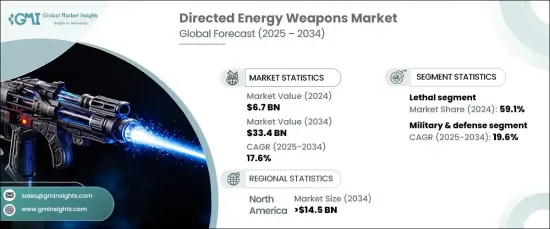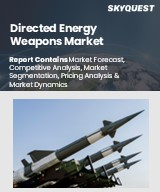
|
시장보고서
상품코드
1666625
지향성 에너지 무기 시장 기회, 성장 촉진요인, 산업 동향 분석 및 예측(2025-2034년)Directed Energy Weapons Market Opportunity, Growth Drivers, Industry Trend Analysis, and Forecast 2025 - 2034 |
||||||
세계의 지향성 에너지 무기 시장은 대폭적인 성장을 이루고 있습니다. 2024년에는 67억 달러에 이르렀으며, 2025년부터 2034년까지의 CAGR은 17.6%로 눈부신 확대가 예측되고 있습니다. 이러한 급성장은 혁신적이고 하이테크적인 방어 시스템에 대한 수요가 증가함에 따라 정밀 조준의 진보에 의해 뒷받침되고 있습니다. 고에너지 레이저 및 마이크로파 기반 시스템을 포함한 DEW(지향성 에너지 무기)는 위협을 무력화하는 강력하고 효율적인 수단을 제공합니다. 이 시스템은 비교할 수 없는 속도와 정확도를 제공하여 신속한 반응 시간과 전략 효율성을 가능하게 합니다. 무인 항공기, 미사일, 첨단 무기 등 다양한 위협에 대항하기 위해 비용 효율적이고 감싸는 피해가 적은 솔루션을 제공하며 현대 군사 전략의 큰 전환을 의미합니다. 세계 안보 상황이 진화함에 따라 신속하고 정확한 방어 솔루션의 필요성이 커지고 있으며, DEW는 국가 안보 무기고에 필수적인 도구가 되었습니다. 기술 혁신과 강화된 군사 능력에 대한 명확한 수요로 인해 이 시장은 세계적으로 방어 전략을 변화시키려고 합니다.

시장은 살상형과 비살상형 DEW로 나뉘며, 2024년에는 살상형 시스템이 시장 점유율의 59.1%를 차지하고 이 분야를 지배했습니다. 이러한 첨단 무기는 감싸는 피해를 최소화하면서 표적을 신속하게 제거하거나 무력화하도록 설계되었습니다. 빛의 속도로 공격하는 치명적인 DEW의 능력은 무인 항공기, 미사일, 적대적 무기와 같은 고속으로 움직이는 위협에 대항하는 데 매우 중요합니다. 이 정확도는 군에게 현대 전투에 대한 신뢰할 수 있고 강력한 도구를 제공하면서 위험을 완화합니다. 치사성 시스템은 또한 한 발당 운영 비용을 줄이고 전략적 가치를 높일 수 있다는 점에서 두드러집니다. 급속한 기술 진보 시대에 신속한 대응 능력에 대한 요구가 증가함에 따라 치사성 부문이 계속 주도권을 잡을 것입니다.
| 시장 범위 | |
|---|---|
| 시작 연도 | 2024년 |
| 예측 연도 | 2025-2034년 |
| 시작 금액 | 67억 달러 |
| 예측 금액 | 334억 달러 |
| CAGR | 17.6% |
용도별로는 군 및 방위 분야가 가장 급성장하고 있으며 예측 기간 중 CAGR은 19.6%로 예상되고 있습니다. 해군, 지상, 항공 플랫폼에 걸친 DEWs의 통합은 군사 작전에 혁명을 일으킵니다. 무인 항공기, 정밀 유도탄, 미사일 공격과 같은 위협을 무력화하는 이러한 시스템의 능력은 군사에게 큰 전술적 이점을 제공합니다. 그 확장성, 신속한 조준, 정확성은 공격과 방어 작전 모두에 필수적이며 현대 군사 전략의 채택 증가를 뒷받침하고 있습니다.
북미는 2034년까지 145억 달러의 지향성 에너지 무기 매출을 창출해 세계 시장을 선도할 것으로 예상됩니다. 이러한 이점은 강력한 정부 투자, 견조한 민간 부문 및 진행 중인 기술 혁신에 의해 지원됩니다. 이 지역에는 지향성 에너지 기술 개발을 가속화하는 주요 기업과 혁신의 기지가 있습니다. 규제 당국의 지원과 국가 안보에 대한 헌신은 북미의 이 시장의 최전선에서의 지위를 확실히 하고 있습니다. 세계 안보 위협이 진화함에 따라, 지향성 에너지 무기의 지속적인 발전은 세계 현대 방어 전략에서 중요한 역할을 할 것을 약속합니다.
목차
제1장 조사 방법과 조사 범위
- 시장 범위와 정의
- 기본 추정과 계산
- 예측 계산
- 데이터 소스
- 1차 데이터
- 2차 데이터
- 유료 소스
- 공개 소스
제2장 주요 요약
제3장 업계 인사이트
- 생태계 분석
- 밸류체인에 영향을 주는 요인
- 이익률 분석
- 방해
- 향후 전망
- 제조업체
- 유통업체
- 공급자의 상황
- 이익률 분석
- 주요 뉴스
- 규제 상황
- 영향요인
- 성장 촉진요인
- 선진 방위 기술에 대한 군사 투자 증가
- 군중 통제를 위한 비치명적 무기에 대한 수요 증가
- 레이저 및 고에너지 무기 시스템의 진보
- 드론이나 무인 항공기에 의한 위협 증대
- 새로운 세계적 위협에 대항하기 위한 전략적 방어 이니셔티브
- 업계의 잠재적 위험 및 과제
- 개발과 배포를 위한 고비용과 재정적 제약
- 군사 용도에 있어서의 규제상 과제와 복잡성
- 성장 촉진요인
- 성장 가능성 분석
- Porter's Five Forces 분석
- PESTEL 분석
제4장 경쟁 구도
- 서론
- 기업 점유율 분석
- 경쟁 포지셔닝 매트릭스
- 전략 전망 매트릭스
제5장 시장 추계·예측 : 제품 유형별(2021-2034년), 100만 달러
- 주요 동향
- 치명적
- 비치명적
제6장 시장 추계·예측 : 기술별(2021-2034년), 100만 달러
- 주요 동향
- 고 에너지 레이저
- 고체 레이저
- 섬유 레이저
- 자유 전자 레이저
- 화학 레이저
- 액체 레이저
- 고출력 무선 주파수
- 협 대역 마이크로파
- 초 광대역 마이크로파
- 전자기 무기
- 입자 빔 무기
- 레이저 유도 플라즈마 채널(LIPC)
- 소닉 무기
제7장 시장 추계·예측 : 플랫폼별(2021-2034년), 100만 달러
- 주요 동향
- 육상
- 장갑차
- 휴대용
- 무기 시스템
- 공중
- 헬리콥터
- 전투기
- 특수 임무 항공기
- 전술 무인기
- 해군
- 전투함
- 잠수함
- 무인수상정
- 우주
제8장 시장 추계·예측 : 용도별(2021-2034년), 100만 달러
- 주요 동향
- 군사 및 방위
- 국경 보호
- 전술 미사일 방어
- 해양 보호
- 군사 기지 보호
- 탄도 미사일 방어
- 위성 미사일 방어
- 지휘, 통제 및 정보 전쟁
- 전장 항공 차단
- 국토 안보
- 폭동 통제
- 공항 보호
- 마약 밀수 방지
- 중요 인프라 보호
- 화학, 생물, 방사능, 핵 및 폭발물(CBRNE)
제9장 시장 추계·예측 : 지역별(2021-2034년), 100만 달러
- 주요 동향
- 북미
- 미국
- 캐나다
- 유럽
- 영국
- 독일
- 프랑스
- 이탈리아
- 스페인
- 러시아
- 아시아태평양
- 중국
- 인도
- 일본
- 한국
- 호주
- 라틴아메리카
- 브라질
- 멕시코
- 중동 및 아프리카
- 남아프리카
- 사우디아라비아
- 아랍에미리트(UAE)
제10장 기업 프로파일
- BAE Systems PLC
- Elbit Systems Ltd
- Honeywell International Inc
- L3Harris Technologies, Inc
- Leonardo SpA
- Lockheed Martin Corporation
- Moog, Inc.
- Northrop Grumman Corporation
- QinetiQ Limited
- Rafael Advanced Defense Systems Ltd.
- Raytheon Technologies Corporation
- Rheinmetall AG
- Textron, Inc.
- Thales Group
- The Boeing Company
The Global Directed Energy Weapons Market is poised for substantial growth, reaching USD 6.7 billion in 2024, with an impressive projected expansion at a CAGR of 17.6% from 2025 to 2034. This surge is fueled by advancements in precision targeting, along with a rising demand for innovative and high-tech defense systems. DEWs, including high-energy lasers and microwave-based systems, offer a powerful and efficient means of neutralizing threats. These systems provide unmatched speed and precision, allowing for quick reaction times and operational efficiency. They represent a significant shift in modern military strategies, offering cost-effective, low-collateral-damage solutions for countering diverse threats, such as drones, missiles, and advanced weaponry. As the world's security landscape evolves, the growing need for rapid, precise defense solutions is making DEWs an essential tool in national security arsenals. With technological innovations and a clear demand for enhanced military capabilities, the market is set to transform defense strategies globally.

The market is divided into lethal and non-lethal DEWs, with lethal systems dominating the sector in 2024, accounting for 59.1% of the market share. These advanced weapons are designed to swiftly eliminate or disable targets with minimal collateral damage. The ability of lethal DEWs to strike at the speed of light is invaluable in countering fast-moving threats like drones, missiles, and hostile weaponry. This precision reduces risks while providing military forces with a reliable and powerful tool for modern combat. Lethal systems also stand out for their reduced operational costs per shot, enhancing their strategic value. The lethal segment will continue to lead, driven by the increasing need for fast-response capabilities in an era of rapid technological advancements.
| Market Scope | |
|---|---|
| Start Year | 2024 |
| Forecast Year | 2025-2034 |
| Start Value | $6.7 Billion |
| Forecast Value | $33.4 Billion |
| CAGR | 17.6% |
In terms of application, the military and defense sector is the fastest-growing segment of the market, with a projected CAGR of 19.6% during the forecast period. The integration of DEWs across naval, ground, and aerial platforms is revolutionizing military operations. These systems' ability to neutralize threats like drones, precision-guided munitions, and missile attacks gives the armed forces a significant tactical edge. Their scalability, rapid targeting, and precision make them indispensable for both offensive and defensive operations, driving their increasing adoption in modern military strategies.
North America is expected to generate USD 14.5 billion in directed energy weapon sales by 2034, leading the global market. This dominance is supported by strong government investments, a robust private sector, and ongoing technological innovations. The region is home to major players and innovation hubs, which accelerate the development of DEW technologies. Regulatory support and a commitment to national security ensure North America's position at the forefront of this market. As global security threats evolve, the continued advancement of directed energy weapons promises to play a crucial role in modern defense strategies worldwide.
Table of Contents
Chapter 1 Methodology & Scope
- 1.1 Market scope & definitions
- 1.2 Base estimates & calculations
- 1.3 Forecast calculations
- 1.4 Data sources
- 1.4.1 Primary
- 1.4.2 Secondary
- 1.4.2.1 Paid sources
- 1.4.2.2 Public sources
Chapter 2 Executive Summary
- 2.1 Industry synopsis, 2021-2034
Chapter 3 Industry Insights
- 3.1 Industry ecosystem analysis
- 3.1.1 Factor affecting the value chain
- 3.1.2 Profit margin analysis
- 3.1.3 Disruptions
- 3.1.4 Future outlook
- 3.1.5 Manufacturers
- 3.1.6 Distributors
- 3.2 Supplier landscape
- 3.3 Profit margin analysis
- 3.4 Key news & initiatives
- 3.5 Regulatory landscape
- 3.6 Impact forces
- 3.6.1 Growth drivers
- 3.6.1.1 Increasing military investments in advanced defense technologies
- 3.6.1.2 Rising demand for non-lethal weapons for crowd control
- 3.6.1.3 Advancements in laser and high-energy weapon systems
- 3.6.1.4 Growing threats from drones and unmanned aerial vehicles
- 3.6.1.5 Strategic defense initiatives to counter emerging global threats
- 3.6.2 Industry pitfalls & challenges
- 3.6.2.1 High costs and financial constraints for development and deployment
- 3.6.2.2 Regulatory challenges and complexities in military applications
- 3.6.1 Growth drivers
- 3.7 Growth potential analysis
- 3.8 Porter’s analysis
- 3.9 PESTEL analysis
Chapter 4 Competitive Landscape, 2024
- 4.1 Introduction
- 4.2 Company market share analysis
- 4.3 Competitive positioning matrix
- 4.4 Strategic outlook matrix
Chapter 5 Market Estimates & Forecast, By Product Type, 2021-2034 (USD Million)
- 5.1 Key trends
- 5.2 Lethal
- 5.3 Non-lethal
Chapter 6 Market Estimates & Forecast, By Technology, 2021-2034 (USD Million)
- 6.1 Key trends
- 6.2 High energy laser
- 6.2.1 Solid-state laser
- 6.2.2 Fiber laser
- 6.2.3 Free electron laser
- 6.2.4 Chemical laser
- 6.2.5 Liquid laser
- 6.3 High-power Radio Frequency
- 6.3.1 Narrow-band microwave
- 6.3.2 Ultra-wideband microwave
- 6.4 Electromagnetic weapons
- 6.4.1 Particle beam weapons
- 6.4.2 Laser-induced plasma channel (LIPC)
- 6.5 Sonic weapons
Chapter 7 Market Estimates & Forecast, By Platform, 2021-2034 (USD Million)
- 7.1 Key trends
- 7.2 Land
- 7.2.1 Armored vehicles
- 7.2.2 Handheld
- 7.2.3 Weapon systems
- 7.3 Airborne
- 7.3.1 Helicopters
- 7.3.2 Fighter aircraft
- 7.3.3 Special mission aircraft
- 7.3.4 Tactical UAVs
- 7.4 Naval
- 7.4.1 Combat ships
- 7.4.2 Submarines
- 7.4.3 Unmanned surface vehicles
- 7.5 Space
Chapter 8 Market Estimates & Forecast, By Application, 2021-2034 (USD Million)
- 8.1 Key trends
- 8.2 Military & Defense
- 8.2.1 Border protection
- 8.2.2 Tactical missile defense
- 8.2.3 Maritime protection
- 8.2.4 Military base protection
- 8.2.5 Anti-ballistic missile defense
- 8.2.6 Anti-satellite missile defense
- 8.2.7 Command, control, and information warfare
- 8.2.8 Battlefield air interdiction
- 8.3 Homeland security
- 8.3.1 Riot control
- 8.3.2 Airport protection
- 8.3.3 Anti-drug smuggling
- 8.3.4 Critical infrastructure protection
- 8.3.5 Chemical, biological, radiological, nuclear, and explosives (CBRNE)
Chapter 9 Market Estimates & Forecast, By Region, 2021-2034 (USD Million)
- 9.1 Key trends
- 9.2 North America
- 9.2.1 U.S.
- 9.2.2 Canada
- 9.3 Europe
- 9.3.1 UK
- 9.3.2 Germany
- 9.3.3 France
- 9.3.4 Italy
- 9.3.5 Spain
- 9.3.6 Russia
- 9.4 Asia Pacific
- 9.4.1 China
- 9.4.2 India
- 9.4.3 Japan
- 9.4.4 South Korea
- 9.4.5 Australia
- 9.5 Latin America
- 9.5.1 Brazil
- 9.5.2 Mexico
- 9.6 MEA
- 9.6.1 South Africa
- 9.6.2 Saudi Arabia
- 9.6.3 UAE
Chapter 10 Company Profiles
- 10.1 BAE Systems PLC
- 10.2 Elbit Systems Ltd
- 10.3 Honeywell International Inc
- 10.4 L3Harris Technologies, Inc
- 10.5 Leonardo SpA
- 10.6 Lockheed Martin Corporation
- 10.7 Moog, Inc.
- 10.8 Northrop Grumman Corporation
- 10.9 QinetiQ Limited
- 10.10 Rafael Advanced Defense Systems Ltd.
- 10.11 Raytheon Technologies Corporation
- 10.12 Rheinmetall AG
- 10.13 Textron, Inc.
- 10.14 Thales Group
- 10.15 The Boeing Company



















